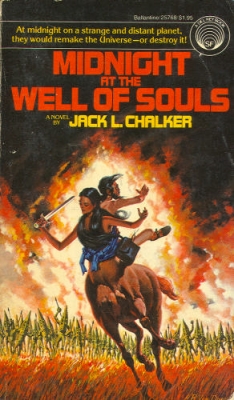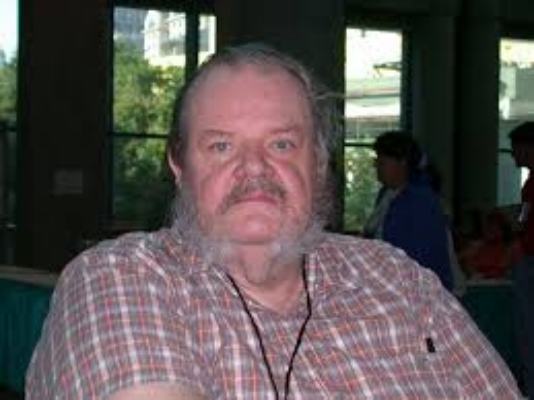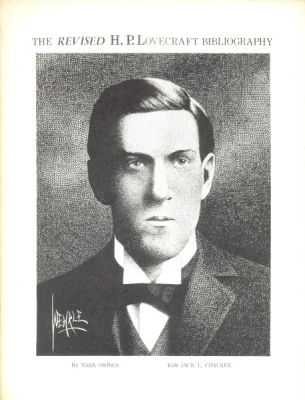The Golden Age of Science Fiction: Jack L. Chalker
The Skylark Award, or more formally, the Edward E. Smith Memorial Award for Imaginative Fiction” is presented annually by NESFA at Boskone to honor significant contributions to science fiction in the spirit of E.E. “Doc” Smith. The award was first presented in 1966 to Frederik Pohl. The award takes the form of a lens on top of a podium. When Jane Yolen received the award in 1990, she placed the award in the picture window in her kitchen. On the next clear day, the lens focused the sun’s rays and burnt Yolen’s coat. Ever since, this cautionary tale has been related to the award’s winner.
The Edmond Hamilton/Leigh Brackett Memorial Award was presented at Octocon by the Spellbinders Foundation in the 1970s and 80s, with the award voted on by the attending membership of the convention. The convention and the award were only in existence for a handful of years, with the first award presented in 1977 to Katherine Kurtz at Octocon 1. The award recognized promotion of the “sense of wonder” in science fiction and fantasy. Some sources list the award as going, in general to the author, while other sources indicated the award was presented for a specific work.
I was introduced to Jack L. Chalker’s works when looking through the pamphlet for the Science Fiction Book Club. At the time, one of the selections that was offered was The Four Lords of the Diamonds, comprised of his novels Lilith: A Snake in the Grass, Cerberus: A Wolf in the Fold, Charon: A Dragon at the Gate, and Medusa: A Tiger by the Tail. Since one of the benefits of being in the SFBC was being able to buy their omnibus volumes, I naturally grabbed it. Later, I read the novels in Chalker’s Well of Souls series. Chalker also wrote the rather strange round-robin novel The Red Tape War with Mike Resnick and George Alec Effinger.
Chalker was not only a fiction writer. With Mark Owings, he published The Index to the Science-Fantasy Publishers in 1966 and a longer work, The Science-Fantasy Publishers: A Critical and Bibliographic History in 1991, with supplements issues each year through 2005. Chalker and Owings earned a nomination for the Hugo for Best Non-Fiction Book for the new edition of The Science-Fantasy Publishers.
Chalker was also involved in science fiction fandom. He published the fanzine Mirage from 1960 to 1971, earning a Hugo nomination in 1963 and used the ‘zine’s name when he established the non-fiction publishing house Mirage Press. In 1963, he helped found the Baltimore Science Fiction Society, which existed for 5 years and is a precursor, but separate entity, to the current organization of that name. Chalker is also credited with coining the term SMOF, a tongue in cheek reference to fans who controlled science fiction society. SMOF, which stands for Secret Master of Fandom, has changed in its meaning from active fanzine fans who influenced the tastes of fandom to those fans who run and coordinate science fiction conventions.
A personal Jack Chalker story. When I was first beginning to participate in panels at science fiction conventions, I was selected to moderate a panel with Jack Chalker and Mike Resnick at Rivercon. I took a look at the situation and realized how ludicrous it was. The topic was one that just required Jack and Mike to talk to each other. There was really no need for a moderator, let alone one who was so new to the scene. It wasn’t even a situation where there was a chance of the discussion becoming contentious and needing a moderator to step in between the other panelists since Mike and Jack were friends and the topic was not particularly controversial. I sat down between the two men, called the session to order, introduced Mike, Jack, and the topic, and walked around the table to sit in the audience to enjoy the rest of the 50 minutes.
NESFA does not release a list of the names of authors who were considered for the Skylark Award.
Chalker (possibly just his novel Midnight at the Well of Souls) beat out Orson Scott Card (“Mikal’s Songbird”), Karen G. Jollie (“The Works of His Hand Made Manifest”), Katherine Kurtz (Saint Camber), and Anne McCaffrey (The White Dragon) to win the Hamilton/Brackett Award.
 Steven H Silver is a sixteen-time Hugo Award nominee and was the publisher of the Hugo-nominated fanzine Argentus as well as the editor and publisher of ISFiC Press for 8 years. He has also edited books for DAW, NESFA Press, and ZNB. He began publishing short fiction in 2008 and his most recently published story is “Webinar: Web Sites” in The Tangled Web. His most recent anthology, Alternate Peace was published in June. Steven has chaired the first Midwest Construction, Windycon three times, and the SFWA Nebula Conference 6 times, as well as serving as the Event Coordinator for SFWA. He was programming chair for Chicon 2000 and Vice Chair of Chicon 7.
Steven H Silver is a sixteen-time Hugo Award nominee and was the publisher of the Hugo-nominated fanzine Argentus as well as the editor and publisher of ISFiC Press for 8 years. He has also edited books for DAW, NESFA Press, and ZNB. He began publishing short fiction in 2008 and his most recently published story is “Webinar: Web Sites” in The Tangled Web. His most recent anthology, Alternate Peace was published in June. Steven has chaired the first Midwest Construction, Windycon three times, and the SFWA Nebula Conference 6 times, as well as serving as the Event Coordinator for SFWA. He was programming chair for Chicon 2000 and Vice Chair of Chicon 7.



I think the only Chalker I ever read was Web of the Chozen (possibly because that was the only one the library owned; or, at least, the only one that wasn’t volume 2 or 3 of some series). I recall enjoying it although it was … weird. (Long story short, and without context: Human gets changed into some kind of weird animal shape, and there’s some surprisingly explicit sexytimes at one point or another.)
Chalker is one big name I completely missed. Pretty sure I never read a single novel or short story by Jack Chalker.
I blame it on a road trip to a New York convention I took in 1983. Chalker was a guest, and my companions on the trip spent much of the journey bad-mouthing his new novels, saying that since he’d switched publishers, his new editor wasn’t firm enough to edit all the “Icky writing,” and the books weren’t as good as early Chalker.
This was fannish gossip at its worst (maybe spread by disgruntled folks at the ex-publisher, for all I knew), but I was still a teen and simply accepted it at face value. It colored my perception of Chalker for decades. Entirely my fault for not looking past it, of course.
Years later, in retrospect, the incident taught me a lot about how powerful critique can be (even a ridiculous one) when you hear it from friends. We see this today (magnified greatly, of course) in social media.
Body swapping is probably the most notable motif in Chalker’s work.
I remember the Well if Souls series on the shelf of a bookshop I frequented when I first started down the F & SF path. Was keen to have a look but just didn’t have the resources. Still keen actually I must really take a crack at them.